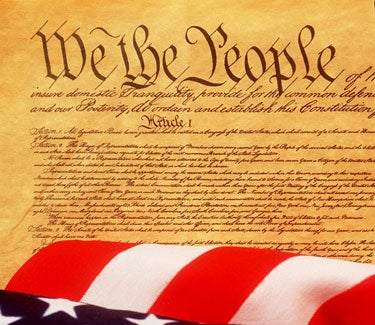If we were to grade our presidents on an A-F scale, which ones would make the cut?
While most contemporary books about presidents focus on leadership and personality, author Steven F. Hayward prefers a different approach – how closely each president adheres to the Constitution. He recently discussed this approach while promoting his new book, The Politically Incorrect Guide to the Presidents: From Wilson to Obama, at the Heritage Foundation (video above).
Why start with Wilson and not Washington? Hayward explains:
There are really two main presidencies to think of — the presidency as the Founders conceived it, and as most of our presidents practiced the institution throughout the 19th century, and then there’s the modern presidency, that I argue really begins decisively with Woodrow Wilson.
Wilson attempted to redefine the office of the president by placing an emphasis on what Hayward called “Leadership with a capital L.” He cites Wilson’s explicit teaching that,
[Presidents should be] taking America to new and undefined places they didn’t even know they wanted to go. [The president] ought to think ahead of the people and pull them along and steer them to where the future would take [them]
This progressive philosophy placed a premium on “charisma” in the presidency that caused people to think of the presidency as “the apex of American politics.” Hayward argues that the Constitutional Presidency should be thought of as a coequal branch of government. The Founders envisioned the presidency as a role for a statesman. Following that line of thought, Hayward devised a system on which to grade the presidents.
He judges the presidents based on a “Constitutional Scale” rather than using ideology. He primarily focuses on Article II of the Constitution, the Article that defines the presidency and the Oath of Office to protect, uphold, and defend the Constitution, which every President is required to take. To determine how well the presidents lived up to their Oath, Hayward asks three main questions:
- Did the President have a well developed Constitutional Philosophy?
- Did the President’s actions in office support or undermine the Constitution?
- Did the President’s Supreme Court picks leave a lasting Constitutional legacy on the Court?
Woodrow Wilson, the first president to openly criticize the Constitution referring to it as “obsolete,” earns an F. Notably, Calvin Coolidge was the lone president to earn an A+.
Joining Wilson in the failing ranks are Franklin Roosevelt, Lyndon Johnson, Jimmy Carter, Bill Clinton, and Barack Obama. Hayward describes Obama as the “perfect epigone” of Woodrow Wilson. “Like Wilson, he doesn’t have much regard for the Constitution,” Hayward notes, citing Obama’s lack of regard for separation of powers and the institutional designs in the Constitution.
Even though the presidency has grown much larger and more powerful than the Founders envisioned, Hayward concluded his talk by offering hope that this is not a trend that is etched in stone:
In the best of all worlds, [we can] return to an older, sounder, constitutional order if [we] would take to heart the wisdom of the Founders.
Ryan McNulty is currently a member of the Young Leaders Program at The Heritage Foundation. For more information on interning at Heritage, please visit: http://www.heritage.org/about/departments/ylp.cfm
